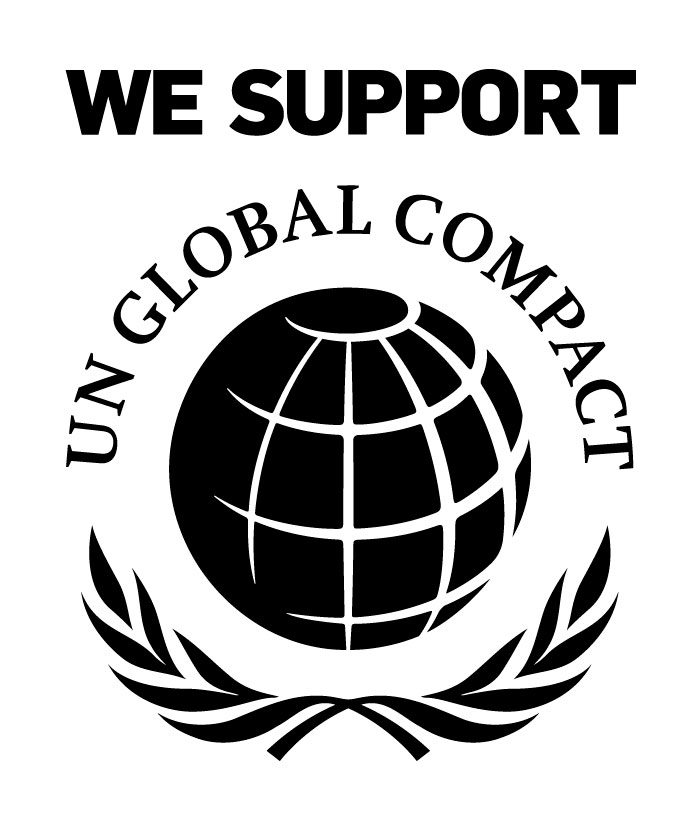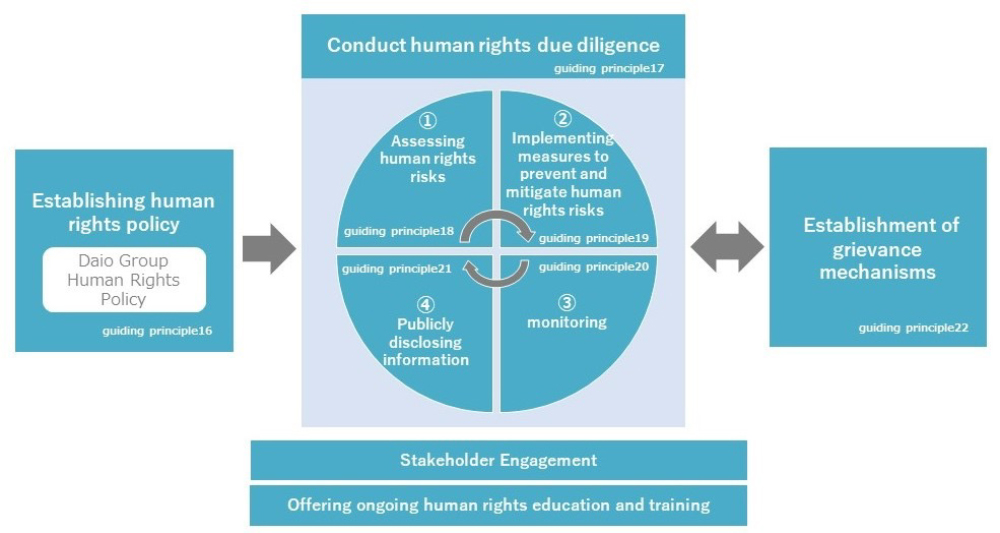The Daio Group established the Daio Paper Group Sustainability Vision in May 2021 with the aim of bringing to life its management philosophy of “shaping an abundant and affable future for the world.” In August in the same year, we announced our support for the objectives of the United Nations Global Compact, which lays down principles on human rights protection and other issues, and in October, we established the Daio Group Human Rights Policy in conformity with the United Nations Guiding Principles on Business and Human Rights.
We believe that a society that respects the inherent freedom, dignity, and rights of all human beings is essential for the abundant and affable future that we envision. Accordingly, we have set forth respect for human rights as one of our material issues.
Under the Daio Paper Group Human Rights Policy, we will work to build human rights due diligence processes, fully educate and train all those concerned on respecting human rights, and take other steps in cooperation with our business partners as we pursue our business in the global arena. Through these efforts, we will contribute to achieving a sustainable world.
Daio Group Human Rights Policy
We believe that the kind of future we want to bring about requires that all societies respect the inherent freedom, dignity, and rights of all human beings. Accordingly, our activities toward shaping “an abundant and affable future” will always be underpinned by our efforts to fulfill our responsibility to respect human rights.
1.Overview
We hereby establish the Daio Group Human Rights Policy (hereinafter “the Policy”) based on the United Nations Global Compact (consisting of 10 principles including those on human rights) and the United Nations Guiding Principles on Business and Human Rights. The Policy was developed with reference to international covenants such as the International Bill of Human Rights (consisting of the Universal Declaration of Human Rights, the International Covenant on Civil and Political Rights and the International Covenant on Economic, Social and Cultural Rights) and the International Labour Organization’s Declaration on Fundamental Principles and Rights at Work.
As guidelines that complement our corporate motto, management philosophy, and code of conduct, the Policy serves as a basis for our actions towards realizing the three goals set forth in our Sustainability Vision, that of “protecting well-being of the body”, “enhancing well-being of lifestyles”, and “restoring well-being of the earth”.
2.Applicability The Policy applies to all directors and employees working for the Daio Group. In addition, efforts will be made to obtain and encourage the understanding, support, and compliance of all our business partners, including suppliers.
3.Measures
We are committed to fulfilling our responsibility to respect human rights. Accordingly, we will take steps to build processes for identifying, preventing, and mitigating adverse human rights impacts that may occur as a result of our business activities. We will also take appropriate measures for remediation if we discover that we are liable to cause an adverse human rights impact through our business activities.
If a business partner or other stakeholder is causing an adverse human rights impact in relation to our business activities, we will take appropriate action and work together toward remediation.
1)Strict compliance with laws and regulations
We will strive to achieve strict compliance with laws and regulations, which is one of the rules in our Code of Conduct, in the countries and regions where we operate. In the event a country/region’s national or regional law or regulation is in conflict with the principles of internationally recognized human rights, we will pursue methods that honor the latter.
2)Human rights due diligence
We will take steps to build processes for human rights due diligence based on the UN Guiding Principles on Business and Human Rights. We will strive to identify, prevent, and mitigate any adverse human rights impacts that we may be causing through our business activities.
3)Remediation
Where we recognize that we have caused or contributed to adverse human rights impacts, we will work towards remediation through appropriate processes.
4)Education
All our directors and employees will undergo appropriate education and training to ensure that they fully understand and can effectively implement the Policy.
5)Discussion and consultation
We will create opportunities to discuss human rights issues with stakeholders and hold consultations in good faith.
6)Information disclosure
We will disclose information concerning our human rights initiatives through websites and other methods.
Support for the UN Global Compact
Daio Paper supports UNGC’s Ten Principles on human rights, labor, the environment, and anti-corruption. Based on the Daio Paper Group Sustainability Vision, we will work to resolve social issues through our business activities, with the aim of realizing our management philosophy of “Shaping an Abundant and Affable Future for the World.”
> Daio Group Sustainability Vision
> Support for the UN Global Compact(Registered on August 23, 2021)
The Ten Principles of the United Nations Global Compact
Human Rights
Principle 1: Businesses should support and respect the protection of internationally proclaimed human rights; and
Principle 2: make sure that they are not complicit in human rights abuses.
Labor
Principle 3: Businesses should uphold the freedom of association and the effective recognition of the right to collective bargaining;
Principle 4: the elimination of all forms of forced and compulsory labor;
Principle 5: the effective abolition of child labor; and
Principle 6: the elimination of discrimination in respect of employment and occupation.
Environment
Principle 7: Businesses should support a precautionary approach to environmental challenges;
Principle 8: undertake initiatives to promote greater environmental responsibility; and
Principle 9: encourage the development and diffusion of environmentally friendly technologies.
Anti-Corruption
Principle 10: Businesses should work against corruption in all its forms, including extortion and bribery.

Human Rights Due Diligence
Through human rights due diligence processes based on the UN Guiding Principles on Business and Human Rights, the Daio Group is striving to identify, prevent, and mitigate any adverse impacts on human rights that its activities may be causing.

Human rights due diligence is a means that enterprises should employ to prevent the violation of human rights and to provide relief to victims of violations.
Scoping and Identifying Human Rights Risks
From among all stakeholders of the Daio Group’s business activities (employees, shareholders and investors, communities including indigenous peoples, business partners, NGOs and NPOs, etc.), we assess human rights risks focusing on employees, temporary workers, third-party contractors, suppliers, communities including indigenous peoples, and customers as stakeholders to be given priority from a human rights perspective.
In cooperation with outside experts, we surveyed the human rights issues specific to our industry and business for each country in the regions where we do business. In doing so, we referred to databases of ESG risk information providers, the International Bill of Human Rights, and the ILO Declaration on Fundamental Principles and Rights at Work.
Through the survey, we identified a total of 25 human rights issues. We then proceeded to assess the impact of each issue on the human rights of our business’s stakeholders: employees, temporary workers, third-party contractors, suppliers, communities including indigenous peoples, and customers.
For salient human rights issues* in particular, their impacts are assessed from such perspectives as the risk’s scope, scale, remediability, and probability of occurrence. Measures to avoid, prevent, and mitigate the negative impacts are discussed at the Management Meeting and are decided on by the Board of Directors.
We also assess new businesses and transactions during their early stages on the negative impact they may have on human rights.
Note:
* Salient human rights issues
・The right to safe and healthy conditions of work (safety and health)
・Overwork, long work hours
・Consumer safety and health
・The right to privacy
・Impact on the daily lives of local residents
・Environmental management
Establishment of grievance mechanisms and access to remedy
The Daio Group’s Corporate Ethics Hotline is an internal whistle-blowing system established as a mechanism for handling grievances, and confidentiality is ensured under the system. All officers and employees are informed about the hotline at least once annually through compliance training.
We will continue to thoroughly inform everyone concerned of these systems as we work to ensure that human rights are respected throughout our corporate activities.

